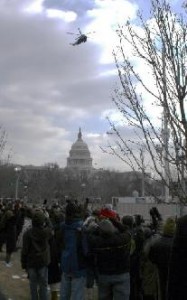Nuclear Weapons Can Be Eliminated: Chapter 1, Part 1
Mar. 11, 2009
Chapter 1: Superpower at a turning point
Part 1: Change
by Yumi Kanazaki, Staff Writer
Time for break with “faith in power”
There are signs that the international situation with regard to nuclear weapons is changing as many people begin to realize that the more these evil weapons proliferate the greater the threat they pose to human existence. Nuclear weapons can be eliminated. We no longer need be bound by the theory of nuclear deterrence. Reporters from the Chugoku Shimbun are traveling around the world to report on the path to nuclear abolition. The first reports in this series are from the United States, where a new president was inaugurated.
The temperature in Washington on January 20 hovered at a chilly minus 7 degrees Celsius (19 degrees Fahrenheit). People shifted from one foot to the other in an effort to fend off the cold.
“Fervor” is inadequate to describe the enthusiasm that fired up the city despite the cold. The inauguration of the nation’s first African-American president was a historic moment. A crowd of 2 million lined the streets along the inaugural parade route hoping to get a glimpse of the new president. They waited patiently in the cold, with no complaint about the crowding, for the car carrying President Barack Obama and his wife Michelle to appear.
“Obama is the hope of all Americans, not just us black Americans,” said a wide-eyed Renee Paterson, 45, who had come from Texas for the inauguration. “The war on terror made a mess of things. I want him to rebuild the country. He can deal with other countries using words not weapons.”
The terrorist attacks on September 11, 2001 changed the U.S. dramatically, and the administration of President George W. Bush devoted its energies to the “war on terror.” The nation’s nuclear policies also changed. The administration, which had believed that terrorists would not consider attacking the U.S. out of fear of nuclear retaliation, promoted the development of a new generation of nuclear weapons to address terrorist attacks. This meant that nuclear weapons would no longer be limited to a deterrent role.
On the steps of the U.S. Capitol adorned with the red, white and blue bunting, Barack Obama delivered his inaugural address to the nation’s citizens. “With old friends and former foes, we will work tirelessly to lessen the nuclear threat,” he said. He did not use the term “nuclear-free world” as he had during the campaign, but he did declare a break with the policies of the previous administration.
Of course, that does not mean nuclear weapons are sure to be eliminated. Mr. Obama has declared that the U.S. “will always maintain a strong deterrent as long as nuclear weapons exist.” With the ongoing financial and economic turmoil, there is no guarantee that nuclear policy will be a top priority. Japan’s policies toward the U.S. will also play an important role in this matter.
Joseph Cirincione, 59, president of the Ploughshares Fund, who served as an informal adviser to Mr. Obama during his campaign, said, “The economic crisis provides a good opportunity to cut expenditures on nuclear weapons. This is the perfect chance to embark on the path to abolition, and we must not miss it.”
The excitement of the inauguration ceremony had not yet abated when there was hubbub in the vicinity of the Capitol as the helicopter carrying former President Bush and his wife Laura took off. As they looked up at the helicopter, the crowd began to boo. The sound suggested the cry of citizens who hope for “change.”
(Originally published on February 11, 2009)
To comment on this article, please click the link below. Comments will be moderated and posted in a timely fashion. Comments may also appear in the Chugoku Shimbun newspaper.








